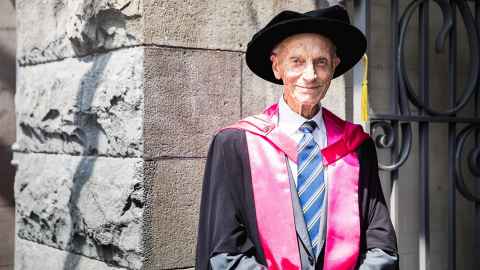Graduating at 90 and still publishing: “It keeps me happy”
5 December 2019
One of New Zealand’s pioneers in critical care medicine is graduating from the University of Auckland with a Doctorate in Medicine at the age of 90, possibly the University’s oldest graduate by thesis, ever.

Dr Ron Trubuhovich ONZM worked in Auckland Hospital’s Department of Critical Care Medicine (what is known now as intensive care) from 1968 for 30 years, first as Deputy than as Chairman for the final 11 years.
He witnessed immense change in this area of medicine. “At one time it was great rejoicing when we had one monitor with a patient’s cardiac tracing on it – now they’ve got all sorts of things monitored, but we started from scratch,” he recalls. “We had a large number of trauma patients, mainly from motorcycle crashes, and they seem to have gone down markedly over the years. We also saw a lot of children, until the Starship ICU was functioning at the end of 1991.
“People were expected not to survive and you took them in, artificially supporting their breathing, circulation, metabolism. We brought our mortality down from 25 percent, till of recent years it is about 12 percent, which is very gratifying.”
He says he felt “great satisfaction” in 1998 when the Medical Council of New Zealand finally accepted Intensive/Critical Care Medicine as an independent medical specialty, following his repeated applications – the first in the mid-1970s.
After retiring from locum work in 1998 aged 69, his lifelong love of history was rekindled. First, he was lead author (with Dr James Judson) of a history of intensive care in New Zealand for the hospital department’s 40th anniversary, which was published in 2001. Then he began publishing an average of two papers a year on the wider history of intensive care, methodically seeking evidence for, and correcting various medical lore from Ancient Greece to the 20th century.
[Ron] began publishing an average of two papers a year on the wider history of intensive care, methodically seeking evidence for, and correcting various medical lore from Ancient Greece to the 20th century.
He wrote papers on Alexander the Great’s legendary early tracheotomy – the conqueror supposedly used the tip of his sword to pierce a choking soldier’s throat (no evidence found this ever happened); on over-enthusiastic claims that Florence Nightingale pioneered the separation of the sickest patients from the less ill in the days before quarantining (Dr Trubuhovich discovered Florence’s own words contradict this); and on the origins of the 18th century Europe-wide practice of rectal fumigation with tobacco smoke in attempted resuscitation from apparent death, especially from drowning (which gave rise to a certain popular saying).
Then he met New Zealand historian Paul Moon at an Auckland Medical History Society event and the pair became good friends. Moon encouraged him to investigate the ill health and cause of death of Captain William Hobson, New Zealand’s first British-appointed Governor, which led to three years of research and a self-published booklet in 2015.
Says Dr Trubuhovich: “There’s nothing written about Hobson’s death – it’s strangely quiet. Two people said he was overdosed deliberately, but that seems unlikely, and I had to say no one knows.”
Having published a number of papers, he realised he may as well draw on them for a Doctor of Medicine thesis. His thesis, “Resuscitation and the origins of intensive care/critical care medicine”, culminated in a demonstration that the ‘definitive’ history book on a pivotal period in the history of critical care, the Danish polio epidemic of 1952-3, had multiple errors.
Dr Trubuhovich keeps himself fit with daily walks around the block with its hill, and was pleasantly surprised a few years ago to find that his pacemaker had worn out and needed replacing, and yet his heart valves and coronary bypass grafts remained “beautifully open” after their 20 years of service.
I don’t feel any different in writing now to how I felt 20 years ago... I’ve been doing the same thing for 20 years. It keeps me happy.
He works in his beloved home library. “I don’t feel any different in writing now, to how I felt 20 years ago. I’ve got access to what I want here, which is good, because you do forget more. But I’ve been doing the same thing for 20 years. It keeps me happy.”
The two Aucklanders among Ron and wife Elizabeth’s three adult children – who all went into Arts – attended his graduation ceremony on Friday 29 November at the Auckland Town Hall.
The Faculty of Medical and Health Sciences has its graduation ceremonies in November to allow graduates to enter the health workforce immediately rather than waiting until May, when students from other faculties graduate. This year, 883 students graduated with qualifications in medicine, nursing, optometry, health science and pharmacy.
Nicola Shepheard | Media Adviser
Tel: 09 923 1515
Mob: 027 537 1319
Email: n.shepheard@auckland.ac.nz